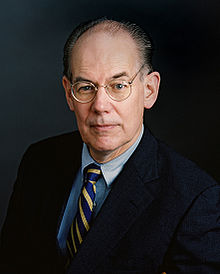
What do the international system and a middle school playground have in common? According to Dr. John Mearsheimer, it is two power-indicating factors: size and wealth.
“Professor John Mearsheimer is one of the most influential political scientists today,” Professor Sunil Sahu, chair of the political science department, said as he introduced this year’s Walker Horizon lecturer, Dr. John Mearsheimer. Mearsheimer is the R. Wendell Harrison Distinguished Service Professor at University of Chicago as well as an influential political science professor and academic scholar.
Michael Froedge, senior political science major, said hearing Mearsheimer speak was an honor and privilege. “In particular, I thought his take on the pitfalls of regime change in the middle east and the imminent need to focus on China in the 21st century is of the utmost importance,” Froedge said.
The lecture was centered around the world’s three great powers: the United States, China and Russia. The world’s current phase of multi-polarity, or multiple great powers, has evolved from a phase of bipolarity (the U.S. and U.S.S.R), or two great powers, during the Cold War. While during the post-Cold War era, the United States stood as the hegemon, or single greatest power, in this phase of unipolarity.
Mearsheimer said there are two key factors that indicate power: population size and wealth. During this phase of multi-polarity, these key factors can be seen in today’s three great powers.
Considering that one of the key indicators of power is population size, Mearsheimer said that by 2050, the population of the United States will reach 389 million, a significant increase from the 2015 population size of 322 million.
Mearsheimer also emphasized the significance of China’s rise to power on the global stage. He also posed the question, “Can China rise peacefully?” In short, his answer was no, due to the possibility of an intense security competition that may lead to war.
“I believe there is going to be an intense security competition between the United States and China, and between China and most of its neighbors,” Mearsheimer said.
His realist logic was simple. The best way to protect yourself in an anarchic international system is to be powerful.
“If you live in a world where there is no higher authority, which is the international system…you can never be certain about the intentions of other states,” Mearsheimer said. “Where there may be powerful states that have hostile intentions, the best way to survive is to be, as we used to say when I was a little boy in New York City playgrounds, the biggest and baddest dude on the block.”
Mearsheimer said we take it for granted that we live in the most powerful state in the Western Hemisphere. The power of the United States gives us a sense of security and rare instances of questioning states with less power than us.
To drive home the importance of power within the anarchic international system, Mearsheimer posed a question to the audience: “How many of you go to bed at night worrying about Canada or Mexico attacking the United States, or Guatemala? You never even would think of that.”
